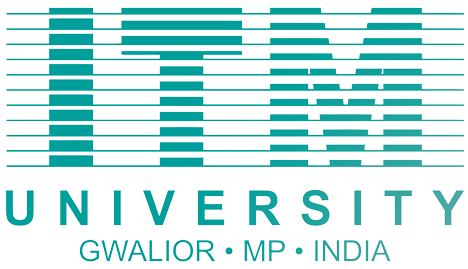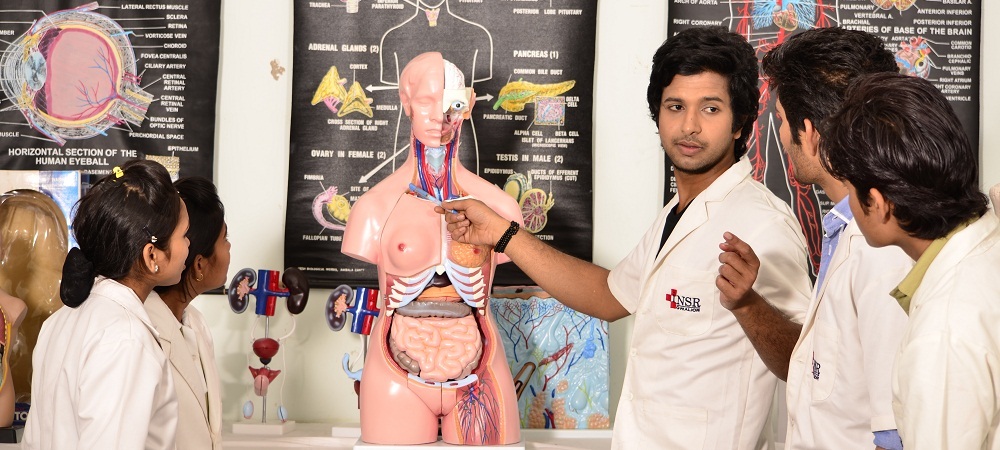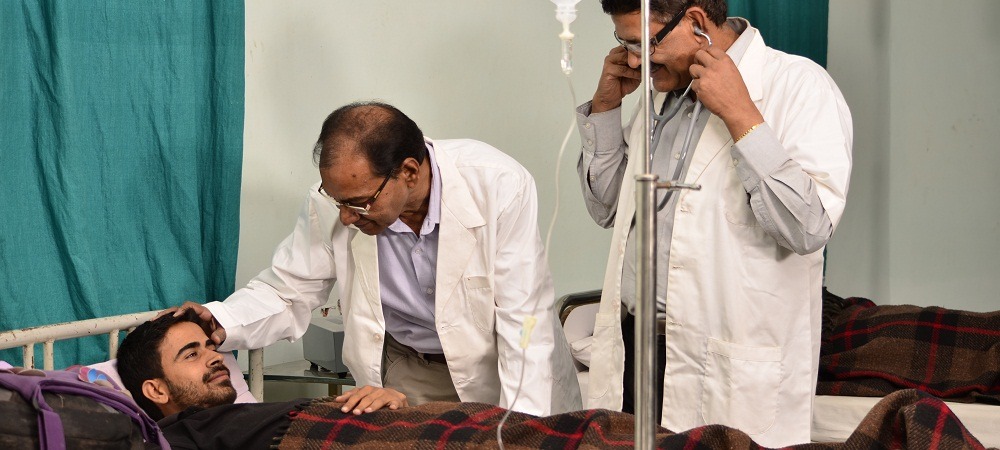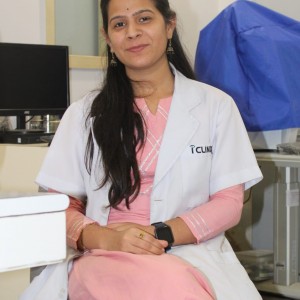School of Nursing
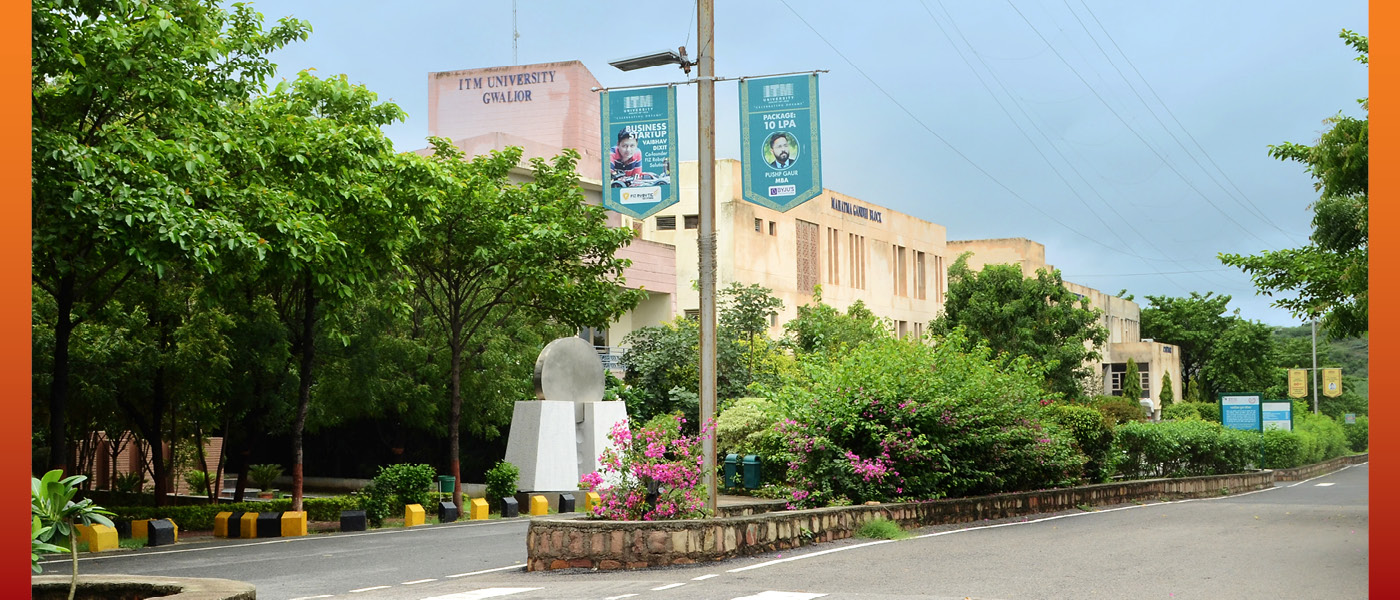
ITM University, Institute of Nursing Science Studies and Research, (INSSR) was established in 2002. The institute is affiliated to ITM University and approved by the Government of Madhya Pradesh. The college has received accreditation from the Indian Nursing Council and State Nursing Council M. P School of Nursing Sciences offers a full spectrum of UG and PG courses, preparing nursing scholars. Nursing Graduates from ITM University enter the healthcare field with a firm foundation in theory, clinical hands-on skills, research, and dynamic personalities which promote them apart as leaders in their profession and have the aura to bring change in the face of the Healthcare delivery system.
At the (INSSR), we support the core values of the nursing profession such as professional and personal integrity, caring, supporting, innovation, and updating the knowledge and skills with the new introductions in the field of medicine and science. The degree programs of nursing play focus mainly on developing critical thinking and problem-solving approaches for nursing students, understanding the economics and hierarchy of the health system, interdisciplinary approach, and effective communication in clinical and public health.
The INSSR faculty are dedicated highly experienced, renowned educators and researchers, with a dedication to inspire change in the healthcare sector through innovation and perfection in nursing education, scholarship, practice, and service.
“Nurses are a unique kind. They have this insatiable need to care for others, which is both their greatest strength and fatal flaw.” —Jean Watson,
As nurses, our work and our vision are key to improving health equity. Health care is on the cusp of a transition—moving away from payment for visits and procedures to payment for population health. This is another space where nurses are leading. Nurses play a key role in transforming health and improving the health of people at large. They are involved in providing care to individuals, families and communities in virtually all locations in which health care services are delivered including hospitals, long-term care facilities, workplaces, terminal care facilities, ambulatory care settings, homes and schools.
As a school, we will focus more on what graduates are able to do rather than on the content that is taught. This provides the opportunity to advance our curriculum to what matters most in people’s real lives. And as leaders in nursing, we must prepare future nurses in ways that include, but are not limited to, the acute care setting. The scope of Nursing practice includes nurses in clinical, faculty, Advanced Practice Nurse, Nurse Leaders and Nurse Researchers. Nursing profession carries the enormous responsibility of leading reforms in health and health care systems, improving health outcomes of patients, their families, generating and translating knowledge that improves nursing education, practices and leadership skills. It is our job to lead our students into the future and equip them for the many roles and settings where our profession is growing.
INSSR offers student-centered, accessible, affordable and high-quality nursing education, and are focus is mainly on student nurse, who wishes to excel in the profession. Our School has been preparing the finest professional nurses who care, cure and create new knowledge in improving the health of individuals, families, and communities. Most importantly, our graduate nurses assume leadership roles around the globe and actively shape the health care of tomorrow.
The college has its own unique interdisciplinary practices where the student learns and works with faculty in practicing clinical skills. We integrate experiential learning and work for future health care professionals.
Dean
Prof. Dr. Mini Anil

Vision of the INSSR
To serve the society as being a global school of higher education in areas of academic excellence, innovation and research.
Mission of INSSR
- Inculcating discipline, knowledge, problem solving ability, leadership, communication and interpersonal skills so as to motivate students to be lifelong learners and to develop the essential skills for serving the global society.
- To create an environment where students and faculty from diverse backgrounds live, study, learn and work together to pursue knowledge and develop the curriculum for global prospective.
- To enable every understudy to find their singular potential by giving open doors to cooperative advancing past the homeroom, in the more extensive local area – across the different range of disciplines.
Programme Offered
- BSc Nursing
- MSc Nursing
BSc Nursing Programme –
The B.Sc. nursing degree program is a four-year full-time program comprising eight semesters, which prepares a student to become a registered nurse qualified to practice in a variety of settings in either public/government or private healthcare settings. It adopts a credit system and semester system as per INC and UGC guidelines. The program encompasses foundational, core, and elective courses. The choice-based system applies to electives only and is offered in the form of modules. Modular learning is also integrated into the foundational as well as core courses that are mandatory.
Duration – 4 years
Eligibility:
- Passed 10+2 examination with Physics, Chemistry, Biology, and English as compulsory subjects. Obtained at least 50% marks (45% in case of SC/ST category) in the above subjects taken together from an approved board.
- Age Criteria- Minimum age of 17 years on 31st December of the year in which admission is sought.
Program Highlights:
- Comprehensive Curriculum: A well-rounded curriculum covering anatomy, physiology, pharmacology, and nursing skills.
- Clinical Training: Extensive hands-on clinical training in hospitals and healthcare settings.
- Patient Care Focus: Emphasis on providing holistic care to patients, including physical, emotional, and psychological support.
- Nursing Ethics: Education on nursing ethics and professional conduct.
- Specializations: Opportunities to specialize in areas like gerontology, or critical care nursing.
- Research Opportunities: Access to nursing research projects and opportunities to contribute to the field.
Scope in BSc Nursing
- BSc Nursing career possibilities in India are many because nurses are in high demand in both the commercial and public sectors, as well as in the healthcare business. The following are some of the places where graduates with BSc Nursing degrees can find work.
- Government hospitals: The job of these nursing experts in government hospitals involves healthcare delivery related to promotion, prevention, treatment, care, and rehabilitation.
- Old age homes: Nurses play an important role in providing quality and safe aged care, which includes contributing to clinical governance systems, upholding older people’s rights to dignity, respect, and autonomy, making care decisions that are consistent with their values and goals, and providing quality, safe care to those in need.
- Nursing homes: They give individuals, families, or groups preventive, curative, rehabilitative, and supportive nursing care and play a key role in health promotion. The emphasis is on compassion, communication, and understanding the patient’s sickness experience.
- Clinics: They are primarily responsible in a clinic or similar setting for gathering patient information and medical history, dispensing appropriate medication, and coordinating with health care professionals.
- School: Throughout the school day, they provide students with basic health services. Students with chronic health concerns and students with impairments are also managed by school nurses. This involves administering medicine as needed and collaborating with parents and teachers to develop and implement care plans.
MSc Nursing Programme :
Post Graduate program is essential to prepare nurses to improve the quality of nursing education and practice in India. Postgraduate program in nursing builds upon and extends competence acquired at the graduate level, and emphasizes the application of relevant theories into nursing practice, education, administration, and development of research skills.
The program prepares nurses for leadership positions in nursing and health fields who can function as nurse specialists, consultants, educators, administrators, and researchers in a wide variety of professional settings in meeting the National priorities and the changing needs of society.
Duration – 2 years
Eligibility Criteria:
- The candidate should be a Registered Nurse and Registered midwife or equivalent with any State Nursing Registration Council.
- The minimum education requirement shall be the passing of a B.Sc. Nursing / B.Sc. Hons. Nursing / Post Basic B.Sc. Nursing with a minimum of 55% aggregate marks.
- The candidate should have undergone in B.Sc. Nursing / B.Sc. Hons. Nursing / Post Basic B.Sc. Nursing in an institution that is recognized by the Indian Nursing Council.
- Minimum one year of work experience after Basic B.Sc. Nursing.
- Minimum one year of work experience before or after Post Basic B.Sc. Nursing.
- The candidate shall be medically fit.
- A 5% relaxation of marks for SC/ST candidates may be given
Program Highlights –
- Utilize/ apply the concepts, theories, and principles of nursing sciences.
- Demonstrate advanced competence in the practice of nursing.
- Practice as a nurse specialist.
- Demonstrate leadership qualities and function effectively as a nursing educator and manager.
- Demonstrate skill in conducting nursing research, interpreting and utilizing the findings from health-related research.
- Demonstrate the ability to plan and effect change in nursing practice and the health care delivery system.
- Establish collaborative relationships with members of other disciplines.
- Demonstrate interest in continued learning for personal and professional advancement.
Career Options After M.Sc. in Nursing
- Students who have completed their M.Sc in Nursing have several work opportunities available to them. They can find opportunities in sectors like NGOs, hospitals, schools, healthcare centers, and orphanages.
- Registered Nurse – A registered nurse is responsible for providing health-related assistance to patients. They take care of the families, communities, and individuals. Their chief aim is to promote health and help in preventing illness.
- Staff Nurse – He/She is responsible for assessing the needs and requirements of the patients. She assists them in making beds, providing medicines, changing patient’s positions, back care et cetera. The main objective of a staff nurse is to ensure the comfort of the patients.
- Nurse Educator – A nurse educator is responsible for educating and instructing aspiring students. They provide them with the necessary knowledge about being a nurse. They teach them the theories as well as help them in practicing the learning.
- Clinical Nurse Manager – The Nurse Manager is responsible for leading the nursing staff. They are required to lead the staff and provide them with guidance to ensure patient health care. They make sure that the best patient care is being provided.
The Institute of Nursing Science School and Research offers programs at the undergraduate and graduate levels. The program has a community-based, population-focused curriculum corresponding to changes in healthcare delivery trends. The curriculum helps students understand community environments as well as nurturing and building relationships with community agencies. The primary goal of the program is to prepare nurses to practice effectively in a variety of settings and administer nursing care, which promotes, maintains, and restores health to individuals, families, and communities. Leadership and a commitment to the profession through research are included in the competencies of the programs. Graduates and postgraduates are prepared to function not only as professional practitioners but also as educated citizens capable of effecting and dealing with change in society.
List of Laboratories:
- Nursing Foundation Including Adult Health Nursing & Advanced Nursing L Ab.
- Community Health Nursing Practice Laboratory & Nutrition Lab.
- Pediatrics Nursing Lab
- Obstetrics And Gynecology Lab.
- Pre-Clinical Lab.
- Computer Lab
- Audio – Visual Lab
- Simulation Lab
- Library equipped with over 600
A challenging profession, Nursing is dedicated to the service of humanity. The ability to understand and soothe is as important to a nurse’s career as expertise in Nursing techniques and care. Institute of Nursing Science and Research has its uniqueness with
- Exposure of nursing students to parent hospitals of 300 bedded NABH accredited super specialty hospitals and various other government hospitals.
- Evidence-based learning methodology.
- Value-added courses are offered to students every semester.
- Simulation-based teaching-learning process.
- Short – Term courses offered by WHO.
- Adopted villages – To conduct Health check-ups and welfare programs.
- Well Equipped laboratories with simulations for better hands-on – experience.
Institute of Nursing Science School and Research adopts
Simulations in Nursing Education
A simulation-based approach to learning has proven to be highly effective across industries because it allows students to develop crucial skills without risk.

Case-based learning
The investigative case-based learning approach is a method of learning and teaching that gives students opportunities to direct their learning as they explore the science underlying realistically complex situations.
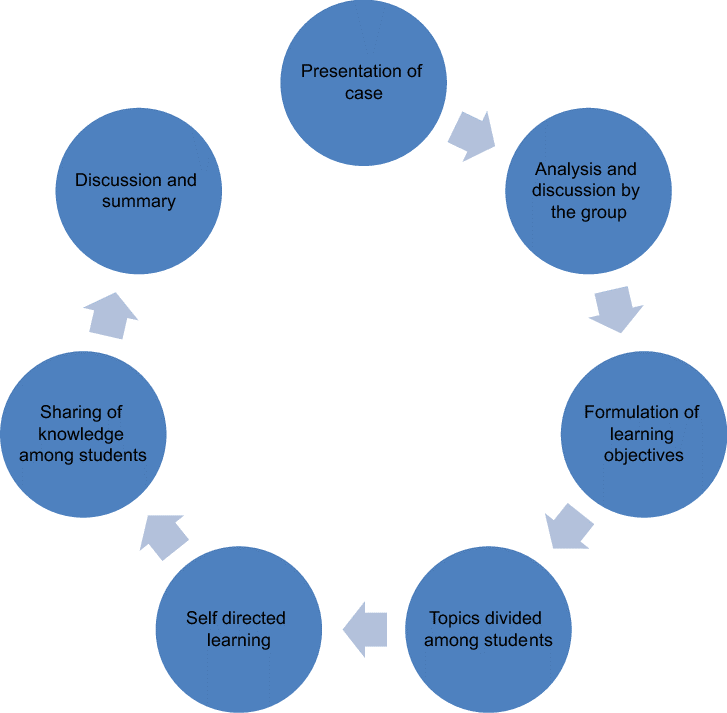
Project-Based Learning
Research confirms that project-based learning (PBL) is an effective and enjoyable way to learn. PBL also develops deeper learning competencies required for success in college, career, and civic life Project-based learning uses real-world scenarios, challenges, and problems to engage students in critical thinking, problem-solving, teamwork, and self-management. Once students solve the problem or challenge, they present their solutions.
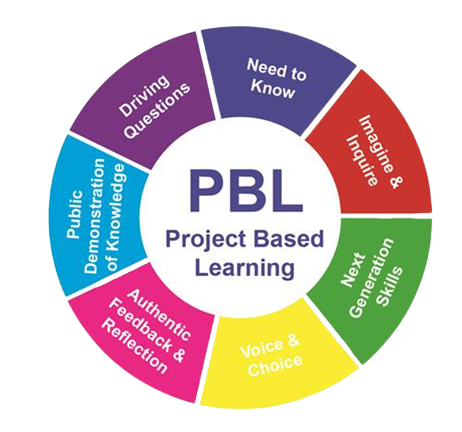
Evidence-Based Practice (EBP)
EBP is imperative for ensuring patient safety. Although teaching strategies to enhance EBP knowledge and skills are ecommended, recent research indicates that nurses may not be well prepared to apply EBP. A three-level hierarchy for teaching and learning evidence-based medicine is suggested, including the requirement for interactive clinical activities in EBP teaching strategies. Interactive methods including interactive lectures, small group work, journal clubs, reading quizzes, clinical nurse presentations, workshops, and problem-based learning are needed in teaching EBP. An interactive approach involves interaction among the participants. Effective learning reflects the quality of teaching. Learning through a constructivist approach refers to the creation of an environment in which the learner is an active participant who gains experience and engages in reflection, leading to problem– based, transformative learning.
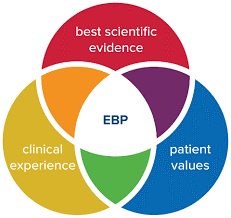
Activity Based Continuous Assessment System (ABCA)
Activity-based learning is the process of learning by performing tasks or activities. INSSR, ITM University adopts ABCA learning to motivate nursing students to participate in their own learning experience via practical activities such as independent investigation and problem-solving. By encouraging students to explore, experiment, and learn independently through activity-based techniques, faculty seek to equip students with skills in critical analysis, problem-solving, and creativity.
- Clinical Placements: Partnering with healthcare facilities to provide clinical placements for nursing students is crucial. These placements allow students to gain hands-on experience under the supervision of experienced professionals. Jayarogya Hospital, Gwalior, Kamla Raja Hospital, Gwalior, District and maternity Hospital Morar, Mansi Aarogya Shala, Gwalior, District Hospital Hajira.
- Research Collaboration: Institute of Nursing Science Studies and Research collaborate with healthcare institutions on research projects. This collaboration not only advances scientific knowledge but also provides students with opportunities to participate in meaningful research.
- Employment Opportunities: Institute of Nursing Science Studies and Research with Industry collaboration can lead to job placement opportunities for nursing graduates. Healthcare institutions often recruit directly from nursing schools they have partnered with. Eg. Fortis,, Max hospitals , NHS hospitals
- Community Engagement: Partnering with industry allows Institute of Nursing Science Studies and Research to engage with the local community through health promotion initiatives, outreach programs, and community health screenings. Like Primary Health Center Aatri, Primary Health Center, Thatipur, District Hospital, Dabra, and Community Health Center Bitarvar
Training and augmentation in INSSR involve various strategies and technologies aimed at enhancing the skills, knowledge, and capabilities of nurses to provide quality patient care.
- Guest Lectures and Workshops: industry professionals to give guest lectures or conduct workshops to expose students to real-world perspectives and challenges, enhancing their learning experience. These programs offer opportunities for nurses to expand their knowledge and skills in specific areas of interest or specialization.
- Simulation-based Training: Simulation-based training allows nurses to practice clinical scenarios in a safe and controlled environment. High-fidelity simulators mimic real patient conditions, helping nurses develop critical thinking, decision-making, and technical skills.
TOP Recruiters
- NHS Hospitals
- Fortis hospitals, India
- MAX Healthcare, India
- Burjeel Hospital, Dubai
- Apollo Hospitals, India
- Medanta Group, India
- Sahyadri Hospitals, India
- All India Medical College, India
- State Government (Community Health Officers.)
- Faculty in Various Institutes.
Register and pay online at http://onlineapply.itmuniversity.ac.in/ or Visit the Counselling Cell at ITM University Gwalior Campus or request by post for the Registration Form to the Counselling Cell of ITM University. The registration fee is to be paid by DD drawn in favor of “ITM University Gwalior” or depositing INR, 11,000/- at the cash counter of ITM University. In Case of online registration, payment is to be made online.



